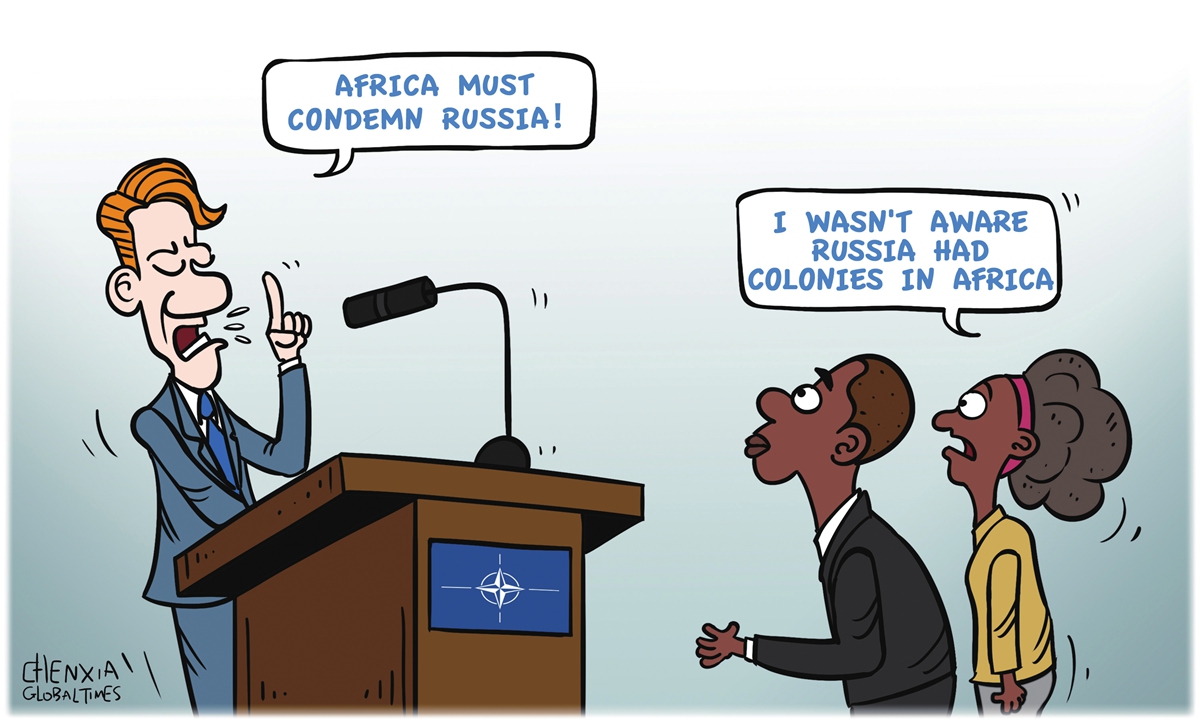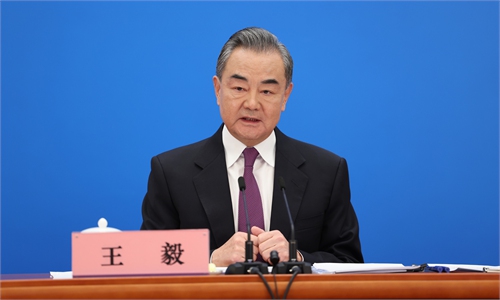
US Africa Illustration: Chen Xia/GT
The African countries' independent stance toward the Ukraine-Russia crisis is informed by a sober and well-calculated assessment based on their own interests, despite the wide condemnation of a moral failure to outrightly condemn Russia for its military operation against Ukraine.
At the UN General Assembly, a majority of African countries either abstained from or opposed a resolution to condemn the Russian actions.
So far, the Western sanctions placed on Moscow have contributed to the highest global crude oil prices in a decade. Prices of commodities - such as wheat, barley, nickel, fertilizers and pesticides - have also soared as a result of their short supply in global markets.
Simply stated, the Russia-Ukraine conflict is having an immense impact on the developing world. Africa especially is struggling to feed its own people. In fact, the UN Food and Agriculture Organization has given a warning that this year, the continent could face serious food insecurity, thanks to conflicts, drought and economic woes triggered by the COVID-19 pandemic.
African countries are not alone in maintaining their independent stance toward the Ukraine-Russia conflicts. Quite a number of the countries in the world, including China, India, and Turkey refused to blindly condemn Russia and ruthlessly pile up sanctions, which are of no use in resolving the issue.
It is ludicrous that the African continent's silence has been apportioned by the media in the West to the expanding influence and economic footprints of Russia in Africa. They have unfairly argued that Africa's refusal to criticize Russia is out of Russia's "colonization" of Africa.
Through Western media, every single nation that the West detests is painted as a threat to Africa. Ironically, it was European countries that colonized African countries, yet they are never featured in their media criticisms.
It's evident that Western media is dotted by racist hypocrisies. We are all aware of their convenient whataboutism. Others have suggested that Africans are guilty of similar hypocrisies, seemingly concerned about events and crises thousands of miles away but happy to ignore the many crises on their own doorstep like Somalia, the Democratic Republic of Congo, South Sudan, and Ethiopia.
African countries should resist the bullying, coercion and skewed representation of the Russia-Ukraine conflict. Instead, they should plunge themselves into the mediation table, advancing negotiations over weapons, use of force, economic sanctions and violation of international law.
Already, South Africa has shown interest in intervening in the dispute to bring about a reconciliation between Russia and Ukraine. Last week, President Cyril Ramaphosa defended South Africa's neutral stance toward Russia's war with Ukraine, observing that it placed him in a stronger position to help mediate an end to the conflict.
The war pushes us back to the incessant calls we have made to the media in the West that they need to go back to a time when issues were covered professionally, objectively and fairly, despite their own interest.
It is unfortunate that the Western media are now being eroded by selfish and political interests. This is their time for self-reflection so that they can go back to their original role of holding the power to account in a balanced manner.
This is especially important now that news consumption is plummeting as alternative news sources emerge. Original, fair and objective reporting will propel them back to profitability and growth.
It may never be possible to realize this in the short term. But it is never too late to do what is right for the globe. The ball is in their court.
The author is a researcher and expert on China-Africa cooperation based in Nairobi, Kenya. Follow him on Twitter @kapchanga. opinion@globaltimes.com.cn

